
No one deserves more blame for the long ordeal suffered by the Scottsboro Boys than does a lower class white woman from Huntsville named Victoria Price. It was her accusation of gang rape aboard a Chattanooga to Memphis freight train, repeated in trial after trial for six years, that led to one of the most protracted and tumultuous legal battles in American history.
In 1931, when the alleged rape aboard the Southern Railroad occurred, Price was a twenty-one-year old spinner at the Margaret cotton mill in Huntsville making $1.20 a day. The Margaret mill was old and dilapidated and fighting a losing battle against the Depression, leaving Price with only five or six days of work a month. It was an unsuccessful job-hunting trip to Chattanooga that put Price and her co-worker Ruby Bates on the same March 25th train as nine black down-on-their-luck teens who would become known as the Scottsboro Boys.
Price was the promiscuous, hard drinking, hard swearing daughter of a Huntsville widow who lived in a poor, racially mixed section of town. She made love in box cars and fields, slept in hobo jungles, and rode the rails in a pair of beaten overalls. A defense affidavit of a one-time neighbor of Price's described her as "a common street prostitute of the lowest type," a woman who would "be out at all hours of the night and curse and swear, and be a general nuisance to the negro population." Another acquitance rounded up by the defense said he saw Price "drunk and in a fight with another woman and she had her clothes up around her body and she had on only two garments, and exposed her private parts." A third acquaintance swore he had overheard Price asking "negro men" the size of their "private parts."
Price's sensational story of being gang-raped by six pistol and knive-waving blacks was attacked by defense lawyer Samuel Leibowitz. Price, however, proved to be a difficult witness to trap. She was evasive, sarcastic, and frequently used ignorance and bad memory to avoid answering difficult questions. When asked about her conviction for adultery, she claimed not to know what adultery was. When Leibowitz tried to use a thirty-four-foot long model train that was a replica of the train on which the rape allegedly occurred, Price refused to admit that it resembled the real train: "That's much smaller....That's just a toy." Her testimony was crudely inflammatory, as when she quoted her supposed attacker as saying, "When I put this in you and pull it out you will have a negro baby."
To any dispassionate observer, the medical testimony provided adequate refutation of Price's charge. Only a small amount of semen, and all of that non-motile, were found in her vagina. Defense testimony indicated that Price had sexual intercourse with Jack Tiller in the Huntsville train yards less than two days before the alleged gang rape, which would account for the semen that was found.
After using Price's testimony to secure convictions in sixteen trials over five years, the prosecution revealed its own doubts about Price's veracity. In a closed door, two-hour plus session in 1936, prosecutors told Price that if she retracted her charges against four of the Scottsboro Boys, she would not be charged with perjury. She refused.
In 1976, after NBC showed a made-for-television movie called "Judge Horton and the Scottsboro Boys," Price emerged to file a defamation and invasion of privacy suit against the network. The case was dismissed. In 1982, Victoria Price died without ever having apoligized for her role in the injustice visited upon the Scottsboro Boys.
